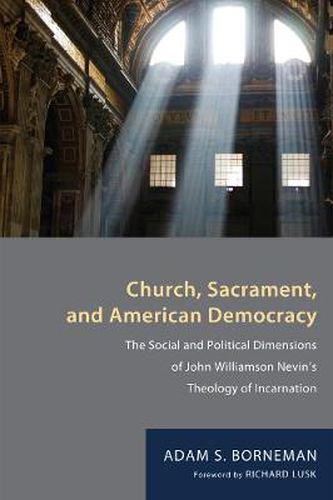Readings Newsletter
Become a Readings Member to make your shopping experience even easier.
Sign in or sign up for free!
You’re not far away from qualifying for FREE standard shipping within Australia
You’ve qualified for FREE standard shipping within Australia
The cart is loading…






This title is printed to order. This book may have been self-published. If so, we cannot guarantee the quality of the content. In the main most books will have gone through the editing process however some may not. We therefore suggest that you be aware of this before ordering this book. If in doubt check either the author or publisher’s details as we are unable to accept any returns unless they are faulty. Please contact us if you have any questions.
John Williamson Nevin, architect of the nineteenth-century movement, the Mercersburg Theology, has increasingly gained respect as one of the most important theologians of American history and the broader Reformed tradition. Accompanied by the great historian, Philip Schaff, Nevin faced a headwind of American individualism, subjectivism, and sectarianism, but nevertheless forged ahead in articulating a churchly, sacramental theology rooted in the Incarnation of Jesus Christ. Drawing from the well of German Idealism and Romanticism, Nevin proposed a theological hermeneutic that was greatly at odds with the prevailing methods of his day. Nevertheless, Nevin persisted in his efforts, confident that the concepts of organic unity, catholicity, and incarnation offered a vital corrective to the tendencies of the American church and society. Hence, Nevin’s theological polemics, while often focused on matters of ecclesiology and sacraments, also have much to offer in the way of a much broader theology of history, mankind, and culture. In this latest contribution to studies in the Mercersburg Theology, Borneman extracts from the Nevin corpus those writings which speak to the predominant social and political trends of the antebellum era, trends which have endured to the present day. Nevin’s efforts toward a liturgically-oriented, unified, prophetic church stood over and against many of these trends. Bringing to the fore the implications of Nevin’s efforts, Borneman joins a chorus of recent scholars and theologians who insist that Nevin has just as much to say to the church of the present as he did to the church of the nineteenth century.
$9.00 standard shipping within Australia
FREE standard shipping within Australia for orders over $100.00
Express & International shipping calculated at checkout
This title is printed to order. This book may have been self-published. If so, we cannot guarantee the quality of the content. In the main most books will have gone through the editing process however some may not. We therefore suggest that you be aware of this before ordering this book. If in doubt check either the author or publisher’s details as we are unable to accept any returns unless they are faulty. Please contact us if you have any questions.
John Williamson Nevin, architect of the nineteenth-century movement, the Mercersburg Theology, has increasingly gained respect as one of the most important theologians of American history and the broader Reformed tradition. Accompanied by the great historian, Philip Schaff, Nevin faced a headwind of American individualism, subjectivism, and sectarianism, but nevertheless forged ahead in articulating a churchly, sacramental theology rooted in the Incarnation of Jesus Christ. Drawing from the well of German Idealism and Romanticism, Nevin proposed a theological hermeneutic that was greatly at odds with the prevailing methods of his day. Nevertheless, Nevin persisted in his efforts, confident that the concepts of organic unity, catholicity, and incarnation offered a vital corrective to the tendencies of the American church and society. Hence, Nevin’s theological polemics, while often focused on matters of ecclesiology and sacraments, also have much to offer in the way of a much broader theology of history, mankind, and culture. In this latest contribution to studies in the Mercersburg Theology, Borneman extracts from the Nevin corpus those writings which speak to the predominant social and political trends of the antebellum era, trends which have endured to the present day. Nevin’s efforts toward a liturgically-oriented, unified, prophetic church stood over and against many of these trends. Bringing to the fore the implications of Nevin’s efforts, Borneman joins a chorus of recent scholars and theologians who insist that Nevin has just as much to say to the church of the present as he did to the church of the nineteenth century.